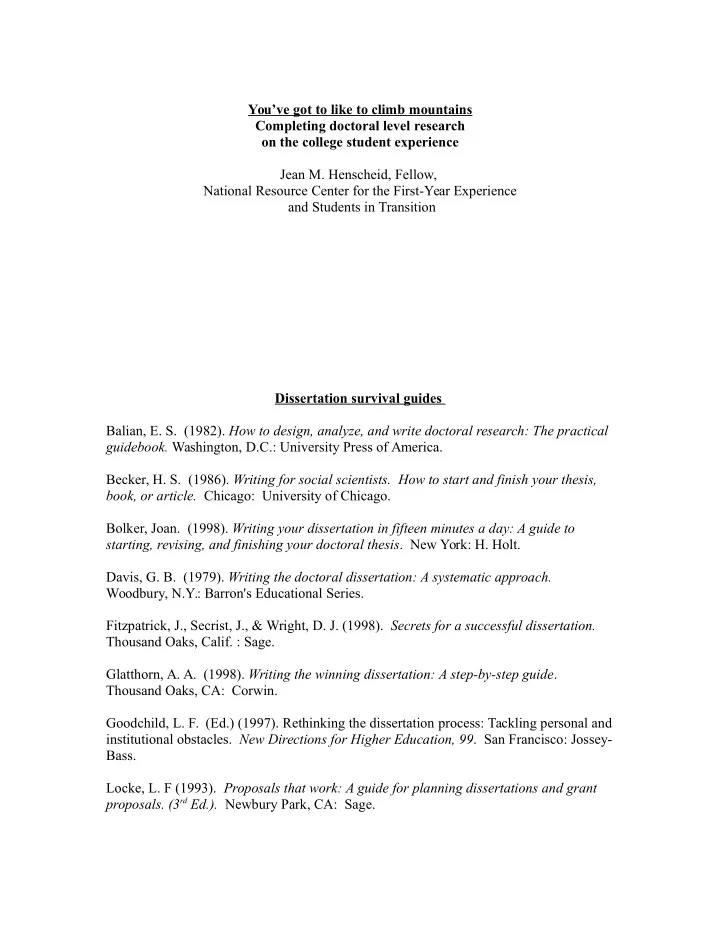

You’ve got to like to climb mountains Completing doctoral level research on the college student experience Jean M. Henscheid, Fellow, National Resource Center for the First-Year Experience and Students in Transition Dissertation survival guides Balian, E. S. (1982). How to design, analyze, and write doctoral research: The practical guidebook. Washington, D.C.: University Press of America. Becker, H. S. (1986). Writing for social scientists. How to start and finish your thesis, book, or article. Chicago: University of Chicago. Bolker, Joan. (1998). Writing your dissertation in fifteen minutes a day: A guide to starting, revising, and finishing your doctoral thesis . New York: H. Holt. Davis, G. B. (1979). Writing the doctoral dissertation: A systematic approach. Woodbury, N.Y.: Barron's Educational Series. Fitzpatrick, J., Secrist, J., & Wright, D. J. (1998). Secrets for a successful dissertation. Thousand Oaks, Calif. : Sage. Glatthorn, A. A. (1998). Writing the winning dissertation: A step-by-step guide . Thousand Oaks, CA: Corwin. Goodchild, L. F. (Ed.) (1997). Rethinking the dissertation process: Tackling personal and institutional obstacles. New Directions for Higher Education, 99 . San Francisco: Jossey- Bass. Locke, L. F (1993). Proposals that work: A guide for planning dissertations and grant proposals. (3 rd Ed.). Newbury Park, CA: Sage.
Doctoral Research Roundtable 2 Long, T. J. (1985). Completing dissertations in the behavioral sciences and education. A systematic guide for graduate students . San Francisco: Jossey-Bass. Mauch, J. E., & Birch, J.W. (1998). Guide to the successful thesis and dissertation: A handbook for students and faculty (4 th Ed.). Monticello, NY: Marcel Dekker. Piantanida, M, & Garman, N. B. (1999). The qualitative dissertation. A guide for students and faculty. Thousand Oaks, CA: Corwin. Rudestam, K. E, & Newton, R. R. (1992). Surviving your dissertation: A comprehensive guide to content and process. Newbury Park, CA: Sage. Sternberg, D. J. (1981 ). How to complete and survive a doctoral dissertation. New York: St. Martin's Press. Web sites http://www.anrecs.msu.edu/dissthes/guide.htm. Tips by S. J. Levine, a dissertation advisor. http://www.vcu.edu/cpp/phd/help.htm. Especially helpful links. An extensive bibliography on managing committees, writing, editing, choosing topics, mental health, etc. http://www.asgs.org/. Association for Support of Graduate Students website. http://www.phinished.org/. A discussion and support group for people who are having trouble getting their dissertations finished. Warning: My recommendation is to use these when you are under duress and need periodic reassurance that what you are going through is “normal.” I suggest they not be read in lieu of doing the hard work of writing the dissertation. There is no magic pill that will make the pain go away. Good luck! Jean Henscheid. National Resource Center for The First-Year Experience and Students in Transition, Students in Transition Conference, Cincinnati, OH: November 1-4, 2000. What most people will tell you: 1. Choose your committee wisely 2. Be your own committee 3. Plan to build a beautiful window, not a beautiful house, or 4. Do not try to solve world hunger
Doctoral Research Roundtable 3 5. Set realistic time lines 6. Start your literature review in the exact middle of your subject 7. Read other proposals and dissertations, but write your own! 8. Choose your methodology wisely: Quantitative and Qualitative (The short of it). A. Formulate the hypothesis or research question B. Design the study C. Collect and analyze the data D. Write it up (This is not the order you’ll write it in!) 9. Begin writing what you know best 10. Write clearly 11. Attend some defenses 12. Move into a hotel for part of it – or choose an equivalent monk-like experience 13. Get a support group What you may not hear – exactly 1. Jean’s 15-minute rule 2. Meditate, exercise, conduct rituals 3. Think of yourself as a scholar 4. Do your citations as you go 5. Endnotes Plus, Statview, and Nudist won’t make the pain go away 6. Have a passion for making a contribution to your field 7. This is just as much about learning the process as it is the product 8. Don’t listen to other people You’ve got to like to climb mountains Applying Taking Finding Deciding Writing Writing The Defense The Classes A on a a “It” Details! Rest Committee Topic Proposal of Your Life
Recommend
More recommend